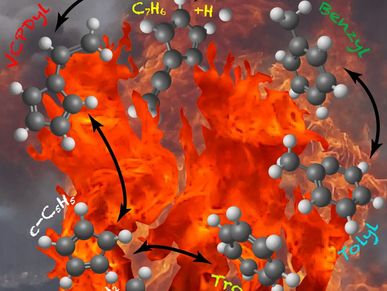Our Research
Carbon-neutral and carbon-negative fuel generation
Carbon-neutral and carbon-negative fuel generation
Carbon-neutral and carbon-negative fuel generation

There is keen interest in hydrogen production through carbon-neutral or -negative approaches for mitigating climate change. We study the chemistry of hydrogen production from hydrocarbon-based fuels, including methane and bioderived hydrocarbons using a variety of experimental and computational tools.
Soot formation in wildfires
Carbon-neutral and carbon-negative fuel generation
Carbon-neutral and carbon-negative fuel generation

We make measurements of particles and their precursors formed during combustion and pyrolysis and analyze those measurements using theory and modeling to gain insight into the chemistry of soot formation during wildfires. The results will be used to improve models of wildfire emissions and propagation.
Black- and brown-carbon formation
Carbon-neutral and carbon-negative fuel generation
Black- and brown-carbon formation

We study the characteristics of combustion-generated particles in laboratory experiments to gain insight into the characteristics and composition of particles when emitted from wildfires and other atmospheric sources, their physical and chemical evolution in the atmosphere, and their impact on the environment.
Particle diagnostics
Black and brown carbon diagnostics
Black- and brown-carbon formation

We develop and use laser-based, X-ray-based, mass spectrometric, and other techniques for studying the chemistry and characteristics of particles generated during combustion, pyrolysis, or other reactive processes.
Black and brown carbon diagnostics
Black and brown carbon diagnostics
Black and brown carbon diagnostics

We develop methods and design instruments for detecting and characterizing atmospheric light-absorbing particles produced predominantly during combustion.
Other fun stuff
Black and brown carbon diagnostics
Black and brown carbon diagnostics
We use our expertise and capabilities to solve problems that have impact on human and non-human health, the environment, agriculture, and industrial processes.
The Particulate Chemistry and Diagnostics Lab
University of Colorado, Boulder, CO 80309
Copyright © 2023 The Particulate Chemistry and Diagnostics Lab - All Rights Reserved.
Powered by GoDaddy